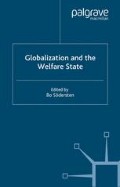Abstract
Since the Second World War, the number of immigrants in Sweden has increased rapidly. In 1940, the proportion of foreign-born people among the total population of the country amounted to only 1 per cent. The proportion had increased to nearly 7 per cent by 1970, and to about 11 per cent at the beginning of the twenty-first century — about 1 million individuals. About 50 per cent of the foreign-born individuals living in Sweden at the time of writing have acquired Swedish citizenship. Moreover, there is a growing group of so-called second-generation immigrants — that is, children born in Sweden with at least one parent born abroad. This group amounts to about 800,000 individuals at present. Thus the total number of first- and second-generation immigrants totals about 1.8 million individuals, some 20 per cent of the total population of Sweden.
I am grateful to Rolf Ohlsson and Bo Sodersten for their useful suggestions.
Access this chapter
Tax calculation will be finalised at checkout
Purchases are for personal use only
Preview
Unable to display preview. Download preview PDF.
References
Behrenz, L. and Delander, L. (2002) ‘Moralisk algebra’ (Moral Algebra), SVDDebatt. Brannpunkt 4 September.
Bevelander, P. (2000) ‘Immigrant Employment Integration and Employment Change in Sweden’, Ph.D. thesis, Lund Studies in Economic History, XV.
Borjas, G. J. (1994) ‘The Economics of Immigration’, Journal of Economic Literature, vol. 32, pp. 1667–717.
Edin, P.-A., Fredriksson, P. and Aslund, O. (2000) ‘Settlement Policies and The Economic Success of Immigrants’, in O. Aslund, ‘Health, Immigration and Settlement Policies’, Ph.D. thesis. Uppsala Economic Studies, LIII.
Ekberg, J. (1983) ‘Inkomsteffekter av invandring’ (Income Effects Due to Immigration), Ph.D. thesis, summary in English, Lund Economic Studies, XXVII.
Ekberg, J. (1990) ‘Immigrants — Their Economic and Social Mobility’, in I. Persson (ed.), Generating Equality in the Welfare State: The Swedish Experience, Oslo: Norwegian University Press, p. 289.
Ekberg, J. (1995) ‘Internal Migration Among Immigrants in Sweden’, Scandinavian Population Studies, vol. 10, pp. 236–46.
Ekberg, J. (1996) ‘Labour Market Careers Among Young Finnish Immigrants in Sweden’, International Migration Quarterly Review, vol. 34, XXXIV pp. 371–84.
Ekberg, J. (1997) Hur ar arbetsmarknaden for den andra generationens invandrare? (How is the labour market situation among the second generation immigrants?) Arbetsmarknad och Arbetsliv 3:5–16.
Ekberg, J. (1999) ‘Immigration and the Public Sector: Income Effects for the Native Population in Sweden’, Journal ofPopulation Economics, vol. 12, pp. 411–30.
Ekberg, J. and Ohlson, M. (2000) ‘Flyktingars arbetsmarknad ar inte alltid nattsvart’ (The Labour Market for Refugees is Not Always Bad), Ekonomisk Debatt, vol. 28, pp. 431–40.
Ekberg, J. and Rooth, D.-O. (2001) ‘Ar invandrare oprioriterade inom arbetsmarknadspolitiken?’ (Are Immigrants Not Given Priority to labour Market Policy Programmes?), Ekonomisk Debatt, vol. 29, pp. 285–91.
Ekberg, J. and Rooth, D.-O. (2003) ‘Unemployment and Earnings for Second Generation Immigrants — Ethnic Background and Parent Composition’, Journal ofPopulation Economics vol. 16 (under publication in no. 4).
Ekberg, J., Sodersten, B., Hammarstedt, M. and Rooth, D.-O. (2002) ‘Hardare tag mot invandrare att vänta’ (Difficulties for Immigrants Are Expected), DN-debatt, 22 April.
Governmental proposition (1995/1996:222) Vissa dtgarder for att halvera arbetslosheten till dr 2000 (Some measures in order to halve the unemployment up to the year 2000), Stockholm.
Gustafsson, B. (1990) ‘Public Sector Transfers and Income Taxes Among Immigrants and Natives in Sweden’, International Migration Quarterly Review, vol. 28, pp. 181–99.
Hammarstedt, M. (2001) ‘Making a Living in a New Country’, Ph.D. thesis, Vaxjo Acta Wexionensia, IX.
Johannisson, B. and Gustavsson, B.-A. (1984) SmdfOretagande pa smdort. Natverkstrategier i informationssamhallet (Small Business in Local Area. Strategies for Networks in the Information Society), Rapport Hogskolan i Vaxjo.
Lindbeck, A. and Snower, D.-J. (2001) ‘Insiders versus outsiders,’ Journal of Economic Perspectives vol. 15, 165–88.
Lundh, C., Bennich-Bjorkman, L., Ohlsson, R., Pedersen, P. and D.-O. Rooth (2002a) ‘Risken for arbetslöshet fyrdubblad’ (Four Times Higher Risk for Unemployment) DN-debatt pp. 11–28.
Lundh, C., Bennich-Bjorkman, L., Ohlsson, R., Pedersen, P. and Rooth D.-O. (2002b) Arbete? Var god droj! Invandrare i valfdrdssamhallet (Employment! Please wait! Immigrants in the Welfare State), Stockholm: SNS, p. 72.
OECD (1999) Trends in International Migration, Paris: Sopemi, p. 47.
OECD (2001) Trends in International Migration, Paris: Sopemi, p. 61.
Ohlsson, R. (1975) Invandrarna pa arbetsmarknaden (Immigrants on the Labour Market), Ph.D. thesis), Lund Ekonomisk-historiska forening, XVI.
Osterberg, T. (2000) ‘Economic Perspectives on Immigrants and Intergenerational Transmissions’, Ph.D. thesis, GothenburgEconomic Studies CII.
Rooth, D.-O. (1999) ‘Refugee Immigrants in Sweden. Educational Investments and Labour Market Integration’, Ph.D. thesis, Lund Economic Studies, LXXXIV.
Scott, K. (1999) ‘The Immigrant Experience: Changing Employment and Income Patterns in Sweden 1970–1993’, Ph.D. thesis, Lund Studies in Economic History, IX.
Vilhelmsson, R. (2002) ‘Wages and Unemployment of Immigrants and Natives in Sweden’, Ph.D. thesis. Dissertation Series, CVL. Swedish Institute of Social Research. Stockholm.
Wadensjo, E. (1973) ‘Immigration och samhällsekonomi’ (Immigration and Economy), Ph.D. thesis, Lund Economic Studies VIII.
Wadensjo, E. (2000) ‘Immigration, the Labour Market and Public Finances in Denmark’, Swedish Economic Policy Review, vol. 7, pp. 59–84.
Specific source data
From Statistics Sweden: data from 1950, 1960 Swedish census, data from 1987, 1991, 1994, 1999 2001 and 2002 Labour Force Surveys, data from 1991, 1994 and 1999 Income Register, data from 1997 and 1999 Employment Register.
Editor information
Editors and Affiliations
Copyright information
© 2004 Palgrave Macmillan, a division of Macmillan Publishers Limited
About this chapter
Cite this chapter
Ekberg, J. (2004). Immigrants in the Welfare State. In: Södersten, B. (eds) Globalization and the Welfare State. International Political Economy Series. Palgrave Macmillan, London. https://doi.org/10.1057/9780230524422_10
Download citation
DOI: https://doi.org/10.1057/9780230524422_10
Publisher Name: Palgrave Macmillan, London
Print ISBN: 978-1-4039-3257-0
Online ISBN: 978-0-230-52442-2
eBook Packages: Palgrave Economics & Finance CollectionEconomics and Finance (R0)

